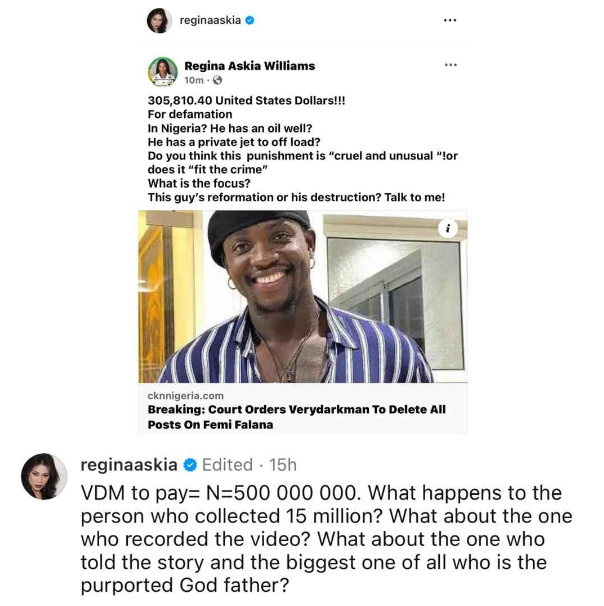Former Nollywood actress and current healthcare professional Regina Askia has waded into the contentious defamation case between social media activist Very Dark Man (VDM) and renowned human rights lawyer Femi Falana (SAN). Askia’s intervention has not only reignited public interest in the case but has also sparked a fierce debate about the nature of truth, responsibility, and justice in the age of social media activism.
The saga began on October 14, 2024, when an Ikeja High Court issued an order directing VDM, whose real name is Martin Otse, to remove defamatory posts about the Falana family. The court also instructed the Falanas to serve their defamation suit through VDM’s lawyer, Deji Adeyanju. This legal move was seen by many as a significant blow to VDM’s brand of confrontational social media activism.
However, the situation took an unexpected turn when false reports began circulating on social media, claiming that the court had ordered VDM to pay a staggering N500 million fine to the Falanas. This misinformation quickly spread, further muddying the waters of an already complex case.
It was against this backdrop of legal action and misinformation that Regina Askia, a respected figure in Nigerian entertainment, chose to speak out. In a post on her Instagram account, Askia raised pointed questions about the veracity of the reported fine and, more provocatively, questioned why no action had been taken against the individual behind the claims in the audio tape that VDM had originally shared.
Askia’s post read in part: “Is the 500 million naira fine true? And why has no action been taken against the person making the claims in the audio tape VDM released?”
This intervention by Askia was not without consequences. The actress faced immediate backlash from some quarters, with critics accusing her of “spreading a negative narrative” about the situation. However, Askia stood her ground, doubling down on her position in subsequent responses.
Askia’s defense of VDM is particularly noteworthy given her status as a respected figure in Nigerian society. Her transition from Nollywood star to healthcare professional in the United States has lent her voice additional weight in matters of public discourse.
This controversy touches on several key issues that are at the forefront of Nigerian public life:
1. **The Role of Social Media Activism**: VDM’s case raises questions about the responsibilities and potential liabilities of social media activists who share controversial information.
2. **Legal Boundaries in the Digital Age**: The case highlights the challenges of applying traditional defamation laws to the fast-paced, often unruly world of social media.
3. **Celebrity Influence on Public Opinion**: Askia’s intervention demonstrates the significant impact that celebrity voices can have on shaping public discourse around complex issues.
4. **The Court of Public Opinion vs. The Court of Law**: The spread of misinformation about the court’s ruling underscores the often-contentious relationship between legal proceedings and public perception.
The public response to Askia’s comments has been divided, reflecting the complex nature of the issues at hand:
Twitter user @NaijaActivist wrote: “Regina Askia is right to question this. We can’t just silence people for sharing information, even if it’s controversial.”
On the other hand, @LegalEagle55 argued: “There’s a difference between sharing information and spreading potentially damaging claims. VDM and now Askia need to understand the responsibility that comes with their platforms.”
Femi Falana’s reputation as a human rights lawyer adds another layer of complexity to this case. Many have expressed surprise at his decision to pursue legal action against a social media activist, viewing it as potentially at odds with his public image as a defender of free speech.
As this controversy continues to unfold, several key questions remain:
– Will Regina Askia’s intervention influence public opinion or potentially the legal proceedings?
– How will this case impact the future of social media activism in Nigeria?
– Could this lead to new legislation or guidelines governing the sharing of potentially defamatory content online?
– Will other celebrities feel emboldened to weigh in on similar controversies in the future?
Regina Askia’s defense of VDM in the face of the Falana defamation case is more than just another celebrity controversy. It represents a critical juncture in Nigeria’s ongoing negotiation with the power and perils of social media activism.
As Nigeria continues to grapple with issues of corruption, accountability, and freedom of speech, cases like this serve as important touchstones for public discourse. They force us to confront difficult questions about the balance between individual rights and social responsibility, the role of celebrity influence in shaping public opinion, and the evolving nature of truth and accountability in the digital age.
As this story continues to develop, it’s clear that its implications extend far beyond the individuals involved. Regina Askia’s bold stance in defense of VDM, set against the backdrop of the Falana family’s legal action, encapsulates many of the tensions and challenges facing Nigerian society today.
In an era where social media has given unprecedented voice to activists and ordinary citizens alike, how do we balance the right to free speech with the need to protect individuals from potentially damaging false claims? How do we ensure that the pursuit of truth and accountability doesn’t become a casualty of legal battles and public relations campaigns?
These are questions that Nigeria, like many nations around the world, must grapple with as it charts its course through the complex landscape of the digital age. The resolution of the VDM-Falana case, and the public discourse surrounding it, may well play a crucial role in shaping the future of free speech, activism, and accountability in Nigeria.
As the nation watches and waits for the next development in this unfolding drama, one thing is certain: the voices of figures like Regina Askia ensure that these critical conversations remain at the forefront of public consciousness, challenging us all to engage with the complex realities of truth, justice, and responsibility in the modern world.



